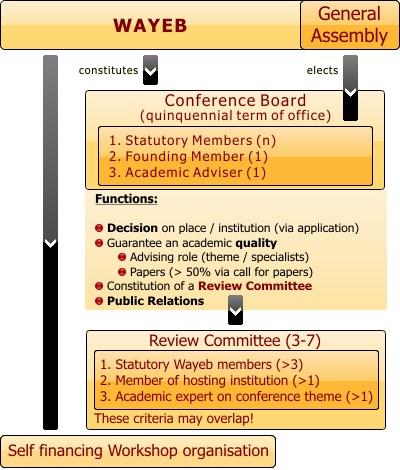 Introduction
Introduction
In 2001, Wayeb assumed responsibility for the organisation of the European Maya Conference that had up to then been planned and realised on a non-formal basis by volunteering European mayanists and the university institutes they were affiliated at.
The European Maya Conferences that were held in London (1996, 2002), Leiden (1997), Hamburg (1998, 2001), Copenhagen (1999) and Bonn (2000) have over the years shaped a certain image of the EMC Series. Having been associated with these events ever since 1996, Wayeb has firmly established the image and corresponding organisational features of the EMC Series in their Internal Regulations I (Annex 3).
Organisation
- The EMC is hosted every year by a different institution which participates actively in the organisation and shaping of the event.
- The EMC generally takes place in autumn or early winter (October-December).
- The EMC always combines a 2-day Symposium or Forum with a 3-day long workshop generally preceding the symposium.
- The EMC covers a specific thematic aspect of Maya Studies, it is not a general research forum.
- The EMC is first and foremost a forum for European scholars, but it kindly invites participants from overseas.
- The EMC is a forum that gives especially young scholars and students a chance to present their individual research by selecting at least 50% of the papers presented at the symposium on the basis of Call-for-Papers and anonymous Review procedures, and not by invitation only.
- Official EMC languages are English and Spanish.
Wayeb’s role in the organisation of an EMC is to ensure the academic quality and organisational success of the event by being responsible for:
- Selecting the hosting institution and conference theme.
- Offering support in the selection of invited speakers.
- Selecting the participants from the Call-for-Papers by nominating a Review Committee, preparing an anonymous (double-blind) review and informing chosen speakers.
- Advertising and announcing the EMC and the Call-for-Papers on the website.
- Providing a central online-registration for the event.
- Coordinating with the local host institution.
- Organising and financing the EMC workshop.
It is the hosting institution’s role to provide:
- Venues and local organisation (volunteers) for Workshop and Symposium.
- Funding for keynote speakers they wish to invite aside from those speakers selected by Wayeb in the Call for Papers.
- Funding for the printing of programmes and badges for the symposium.
Institutions who want to host the EMC should apply to the Conference Board with a topic and verification of infrastructure before 31 January of the year prior to the organised event. The Conference Board informs applying institutions at the latest by 31 May of the same year. We appreciate it, when applications arrive several years in advance to give us the opportunity for long-term planning and early acceptance of applications.
We kindly ask all applying institutions and all individuals interested in the organisational system of the EMC Series to read the full version of the EMC regulations.
Funding & Fees
The conference fees paid by attendees of the symposium belong to the hosting institution and provide the host with a modest budget that may suffice to cover costs for rooms, programmes, maybe 1-2 keynote speakers.
However, hosting institutions are strongly advised to access other funds or request monies from other local institutions, if they want to cover the costs for more invited speakers. Furthermore, it is highly appreciated if hosting institutions can cover accommodation and/or travel costs for speakers selected through the call for papers.
Wayeb kindly asks hosting institution to return unused, left-over fee-monies to Wayeb to provide a secure budget for forthcoming EMC events.
Proceedings
The hosting institution has the right to name the editor(s) of the Conference Proceedings published by Verlag Anton Saurwein. In the event that no local editor(s) can be found, Wayeb will try to step in and find an editor.
In compliance with the general orientation of Wayeb and its statutes, the thematic focus of the EMC series is Ancient Maya Culture and all the related subdisciplines. By the selection of its themes, the EMC Series shall distinguish itself from other conference events in the fields of anthropology, archaeology, history and linguistics etc. Topics which regard for instance the Colonial and Modern History of the countries forming the Maya area are only relevant as far as they contribute to a general understanding of Maya cultural history.
The 3- to 4-day long workshop part of the EMC generally precedes the conference. It offers an introduction to Hieroglyphic writing for beginners and presents an opportunity for advanced students and amateurs to work together on an international level. There are also regularly various types of special workshops (not only on hieroglyphs). Tuition provided by experienced staff. Wayeb offers participants a standard introductory workbook written by Harri Kettunen and Christophe Helmke.
From the Table of Contents:
- History of Decipherment
- Origins of the Maya Script
- Language(s) of the Hieroglyphs
- Writing System
- Grammar
- Typical Structure and Content of the Texts
- Note on the Calendar
- Concise Classic Maya-English Dictionary
- Glossary


